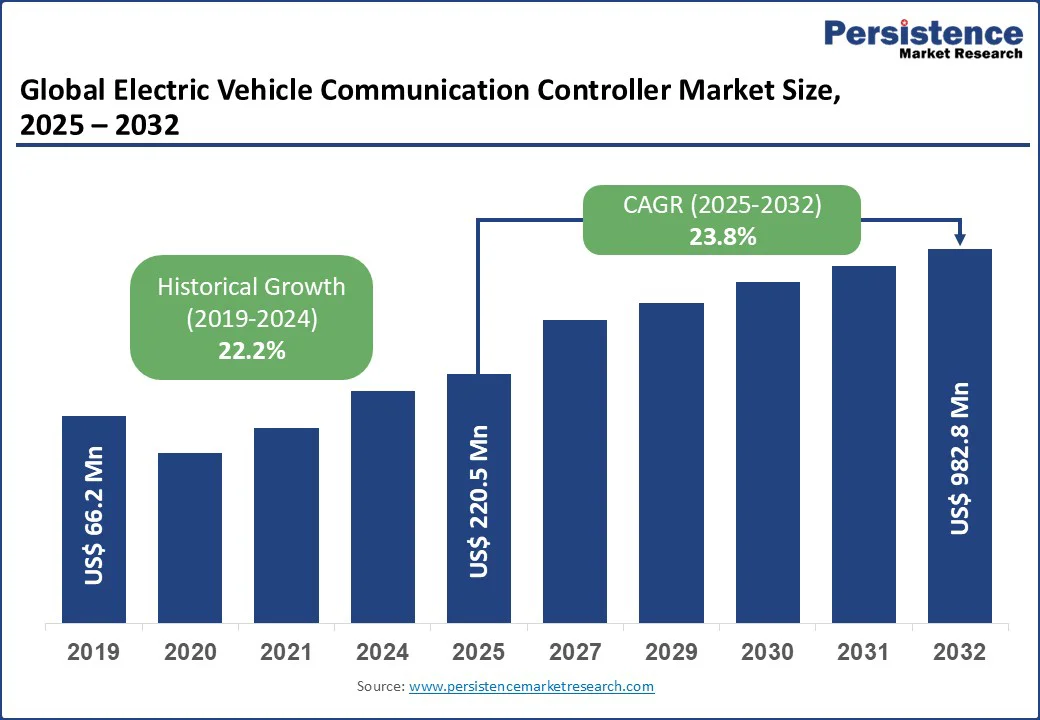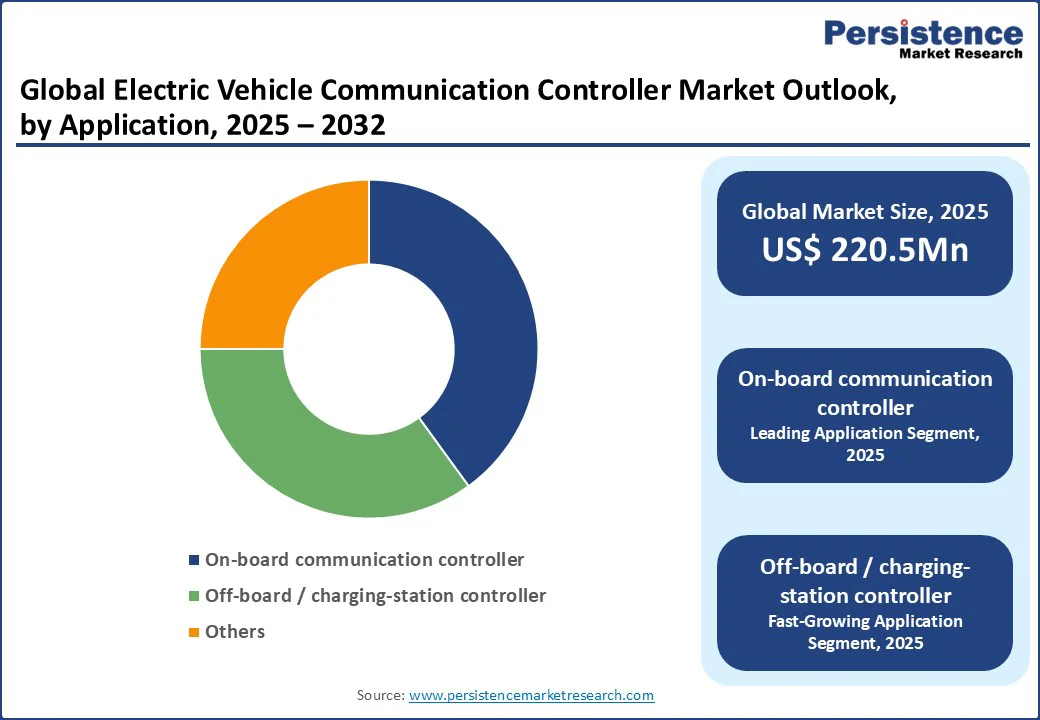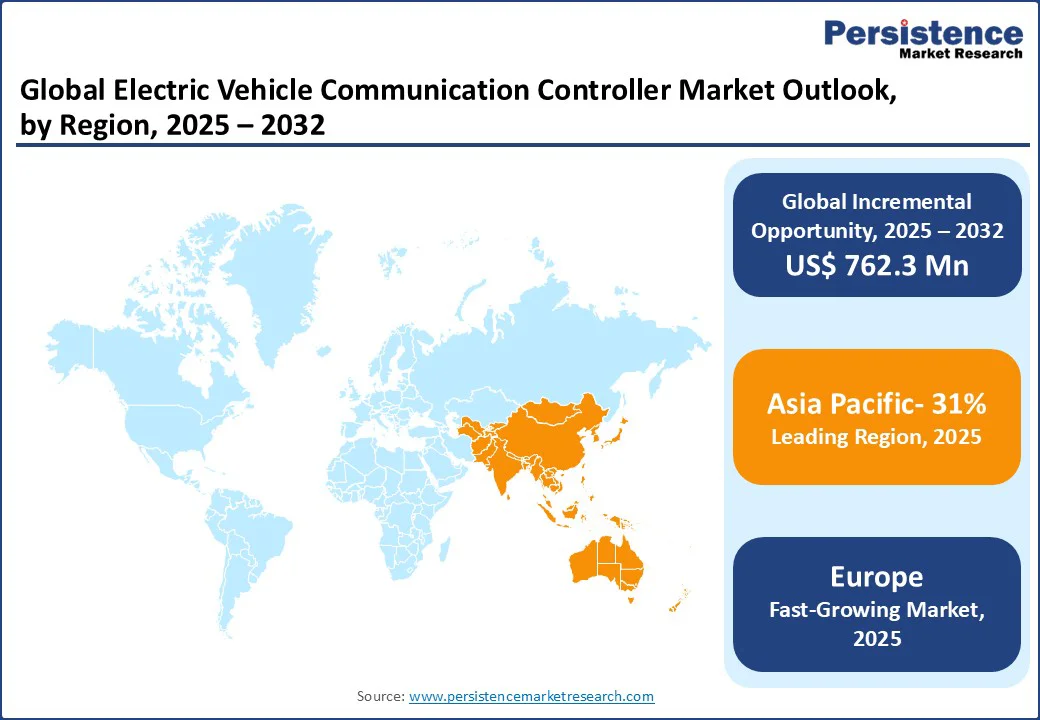ID: PMRREP30127| 181 Pages | 10 Sep 2025 | Format: PDF, Excel, PPT* | Automotive & Transportation

The global electric vehicle communication controller market size is likely to be valued at US$220.5 Mn in 2025 and is expected to US$982.8 Mn by 2032, registering a CAGR of 23.8% during the forecast period from 2025 to 2032.
Key Industry Highlights:

| Global Market Attribute | Key Insights |
|---|---|
| Electric Vehicle Communication Controller Market Size (2025E) | US$220.5 Mn |
| Market Value Forecast (2032F) | US$982.8 Mn |
| Projected Growth (CAGR 2025 to 2032) | 23.8% |
| Historical Market Growth (CAGR 2019 to 2024) | 22.2% |
The electric vehicle communication controller market is experiencing robust growth, driven by the rising adoption of electric vehicles (EVs), advancements in vehicle-to-grid (V2G) technologies, and increasing demand for efficient charging solutions. Industry expansion is further supported by global efforts to promote sustainable transportation and enhance energy management systems in developing regions.
The global surge in electric vehicle adoption is a primary driver of the electric vehicle communication controller (EVCC) market. According to the International Energy Agency, global EV sales exceeded 17 Mn units in 2024, with battery electric vehicles (BEVs) and plug-in hybrid electric vehicles (PHEVs) gaining traction due to consumer demand for sustainable transport and supportive government incentives.
This growing adoption, particularly in urban areas with high pollution levels, highlights the need for EVCCs to enable seamless vehicle-to-grid (V2G) integration and efficient energy management. Recent reports noted Mns of EVs in Asia Pacific alone, underscoring the demand for communication controllers to optimize charging and grid connectivity, significantly improving efficiency in smart charging scenarios.
Technological advancements in EV communication systems are significantly boosting market growth. Advanced platforms, such as Bosch Limited’s EVCC systems, provide high interoperability and secure data exchange, reducing communication latency by nearly half compared to traditional systems, with compatibility rates exceeding four-fifths across global charging standards.
Innovations such as wireless communication modules and AI-driven protocol analysis enhance adoption, particularly in regions with limited wired infrastructure. For example, Delta Electronics’ controllers integrate real-time data processing, enabling faster charging and grid synchronization, which is critical in high-density EV markets.
Government initiatives and increased funding for EV infrastructure are key growth drivers. In Asia Pacific, China’s New Energy Vehicle (NEV) plan and India’s FAME scheme promote investment in EVCC technologies.
In Europe, the EU’s Green Deal and Horizon Europe program support research into smart charging and V2G systems, while in North America, the U.S. Department of Energy programs expand access to advanced controllers. Favorable EV incentives and post-pandemic focus on renewable energy further encourage manufacturers to invest in EVCC solutions.
The high cost of electric vehicle communication controllers remains a significant barrier to widespread adoption, particularly in low- and middle-income countries. Advanced EVCC systems, featuring high-speed data integration and secure protocols, require substantial upfront investment.
Ongoing costs for software updates, calibration, and regulatory compliance further increase the total cost of ownership. In regions such as Sub-Saharan Africa and parts of Latin America, where infrastructure budgets are limited, these financial constraints restrict EVCC adoption, despite growing EV penetration.
The International Energy Agency notes that “the cost of advanced EV components can deter adoption,” emphasizing high implementation costs as a barrier in many countries.
The need for skilled personnel to operate and maintain EVCC systems also hinders market growth. Managing communication protocols and integrating with charging infrastructure requires specialized training for technicians. A shortage of certified EV electronics experts in developing regions exacerbates this challenge.
For instance, in rural Asia Pacific markets, the lack of trained professionals limits deployment, while high training costs further restrict adoption in emerging markets, slowing overall market expansion.
The development of compact and advanced EVCC systems presents significant growth opportunities, enabling deployment in diverse charging scenarios, including mobile units and decentralized grids. These systems address the limitations of traditional wired controllers, making them ideal for regions with limited infrastructure.
For example, Delta Electronics’ EVCC supports rapid data exchange within seconds, enabling use in remote and field settings, which is critical in rural electrification projects.
The growing popularity of vehicle-to-grid (V2G) technology, such as bidirectional controllers for energy sharing, offers another avenue for market expansion. These technologies require minimal upgrades and deliver cost savings, with studies showing V2G-enabled EVCCs significantly reducing energy costs compared to traditional systems. This drives demand in EV-heavy regions such as the Asia Pacific, where urban grids face high demand.
The integration of digital platforms for remote monitoring and data sharing further enhances market potential. Companies such as Continental AG are adopting IoT-enabled systems for real-time transmission and proactive management, improving operational efficiency and accessibility. This trend supports market growth in both developed and emerging regions, particularly in smart city initiatives.
The global electric vehicle communication controller market is segmented into battery electric vehicle (BEV) and plug-in hybrid electric vehicle (PHEV). Bev dominates, holding approximately 35.5% share in 2025, due to its critical role in fully electric vehicles amid widespread EV adoption. Advanced BEV controllers, such as those from BYD Company Ltd., are widely adopted for their seamless integration and rapid data processing, making them essential in mobility ecosystems.
PHEV is the fastest-growing segment, driven by increasing demand for hybrid solutions in transitional markets. Innovations in PHEV communication technologies, such as Mitsubishi Electric Corporation’s controllers, offer enhanced flexibility and compatibility, boosting adoption in high-volume EV markets.
The global electric vehicle communication controller market is divided into wired and wireless charging. Wired dominates with a 40% share in 2025, driven by its widespread use in established charging infrastructure. These systems ensure stable connections, critical for public and private charging stations, with Mns of units deployed globally.
Wireless is the fastest-growing segment, fueled by advancements in inductive charging and growing consumer demand for contactless solutions. Its ability to provide convenient, efficient charging drives adoption in advanced networks, particularly following the global push for innovative EV technologies.
The global electric vehicle communication controller market is segmented into on-board communication controller and off-board / charging-station controller. On-board communication controller dominates with a 40% share in 2025, driven by its essential role in managing vehicle data and connectivity. This application relies on embedded systems for real-time energy management, making it critical for vehicle operations and fleet management.
Off-board / charging-station controller is the fastest-growing segment, propelled by increasing investments in charging infrastructure and smart grid integration. These controllers, enabling station-side management, cater to the growing demand for high-throughput systems in public and commercial charging networks.

Asia Pacific dominates the electric vehicle communication controller market, expected to account for 31% of the electric vehicle communication controller market in 2025. This dominance is driven by high EV production, robust infrastructure development, and increasing environmental awareness in countries such as China and India.
The International Energy Agency reports Mns of new EV registrations annually in the region, underscoring the need for advanced communication solutions. Leading brands such as BYD Company Ltd. and Delta Electronics are developing innovative platforms to support EV ecosystems with efficiency, reliability, and scalability.
Consumer preferences are shifting toward automated, AI-integrated systems, such as Bosch Limited’s controllers, which enhance charging accuracy and grid compatibility. Government initiatives, such as China’s NEV policy and India’s FAME scheme, incentivize EVCC adoption, while regional investments in smart grids further support market growth.
Europe represents the fastest-growing market for electric vehicle communication controllers, driven by stringent environmental regulations, increasing EV adoption, and expanding charging networks. Germany holds the largest share, supported by strong sales from companies such as Bosch Limited and Vector Informatik GmbH. The EU’s Green Deal fosters innovation and compliance, promoting the adoption of advanced wired and wireless systems in major facilities.
In the U.K., market growth is driven by rising demand for smart charging solutions, with products such as Ficosa International S.A.’s controllers gaining popularity for their precision and portability. France is witnessing increased demand for V2G-related applications, with Mitsubishi Electric Corporation offering specialized solutions. Regulatory support for sustainable mobility across Europe further enhances market prospects.
In North America, the U.S. is driven by high demand for sustainable transport, advanced EV infrastructure, and growing EV sales. The U.S. Department of Energy reports substantial growth in EV registrations annually, highlighting the need for robust communication solutions. Leading brands such as Sensata Technologies and Continental AG are developing innovative platforms to support charging teams with accuracy, speed, and user-friendly methods.
Consumer preferences are shifting toward integrated, high-performance controllers with AI-driven analytics, such as those from Delta Electronics, which improve system efficiency. Stringent regulations prioritize energy efficiency, encouraging the adoption of reliable components. Favorable EV incentives further incentivize manufacturers and charging operators to invest in advanced equipment, supporting market growth.

The electric vehicle communication controller market is highly competitive, with global and regional players competing for market share through innovation, competitive pricing, and reliability. The rise of wireless and V2G-enabled controllers intensifies competition, as companies strive to meet stringent regulatory standards and EV demands. Strategic partnerships, mergers, and regulatory approvals are critical differentiators in this dynamic market.
The electric vehicle communication controller market is projected to reach US$220.5 Mn in 2025.
Rising EV adoption, advancements in V2G technologies, and government initiatives for sustainable transportation are the key market drivers.
The electric vehicle communication controller market is poised to witness a CAGR of 23.8% from 2025 to 2032.
Innovations in wireless charging systems and V2G integration present significant growth opportunities.
Delta Electronics, Continental AG, and Bosch Limited are among the leading market players.
| Report Attribute | Details |
|---|---|
| Historical Data/Actuals | 2019 - 2024 |
| Forecast Period | 2025 - 2032 |
| Market Analysis | Value: US$ Mn Volume: As Applicable |
| Geographical Coverage |
|
| Segmental Coverage |
|
| Competitive Analysis |
|
| Report Highlights |
|
By EV Type
By Charging
By Application
By Region
Delivery Timelines
For more information on this report and its delivery timelines please get in touch with our sales team.
About Author